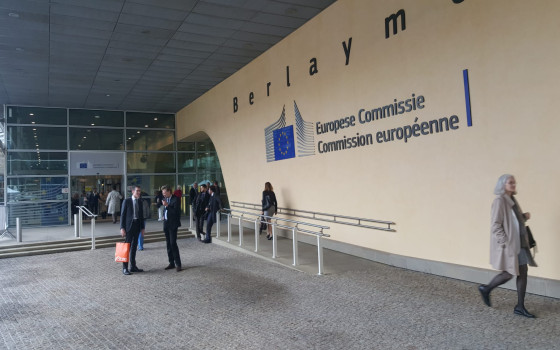
The European Commission opens an investigation into the possible involvement of companies in violating competition rules in the online food delivery sector

- Europe and Arabs
- Tuesday , 23 July 2024 14:1 PM GMT
Brussels: Europe and the Arabs
The European Commission has opened a formal antitrust investigation to assess whether Delivery Hero and Glovo have breached EU competition rules by participating in a cartel in the online ordering and delivery sector of food, groceries and other daily consumer goods in the European Economic Area ('EEA'). ).
"Online food delivery is a fast-growing sector in which we must protect competition. That is why we are investigating whether Delivery Hero and Glovo have agreed to share markets and not poach each other's employees," said Margrethe Vestager, Vice President of the Commission in charge of the Competition File. The conduct may amount to a violation of EU competition rules, with potentially negative consequences for prices, consumer choice and opportunities for workers.”
According to what was stated in a European statement distributed today in Brussels, it also stated, “Delivery Hero and Glovo are two of the largest food delivery companies in Europe. As of July 2018, Delivery Hero owned a minority stake in Glovo, and in July 2022 it acquired its sole control.
The Commission is concerned that, prior to the acquisition, Delivery Hero and Glovo may have allocated geographical markets and exchanged commercially sensitive information (for example, on commercial strategies, prices, capacity, costs and product characteristics). The committee is also concerned that the companies may have agreed not to steal each other's employees. These practices were facilitated by Delivery Hero's minority stake in Glovo.
If proven, the companies' conduct may violate EU competition rules prohibiting cartels and restrictive trade practices (Article 101 of the Treaty on the Functioning of the European Union ('TFEU') and Article 53 of the EEA Agreement).
The Commission will now conduct its in-depth investigation as a matter of priority. Opening an official investigation does not constitute a prejudgment on its results.
It is noteworthy that in June 2022 and November 2023, the Commission conducted unannounced inspections at the headquarters of the companies Delivery Hero and Glovo, as part of its own investigation into possible collusion in the food delivery sector.
Delivery Hero, headquartered in Germany, is an active food ordering and delivery company. It is currently present in more than 70 countries around the world and cooperates with more than 500,000 restaurants. Delivery Hero is listed on the Frankfurt Stock Exchange
Glovo, headquartered in Spain, is a company active in the food ordering and delivery space. It is currently present in more than 1,300 cities in 25 countries around the world. In July 2022, Delivery Hero acquired a majority stake in Glovo, and Glovo became a subsidiary of Delivery Hero.
Today's investigation is part of the Commission's efforts to ensure that the online food delivery and grocery sector offers affordable choices and prices to consumers. In a young and dynamic market, such as the one in question, anti-competitive agreements and restrictive business practices, including cartelization through market allocation, may lead to unobtrusive market consolidation, with potentially negative effects on competition.
This investigation is also part of the Commission's efforts to ensure a fair labor market where employers do not collude to limit the number and quality of opportunities available to workers but compete for talent. This is the first investigation into no-poaching agreements formally initiated by the Commission.
This is also the first investigation by the Commission into anti-competitive agreements that may have occurred in the context of a minority shareholding by a single operator in a competing company.
Article 101 The TFEU prohibits agreements and concerted practices that may affect trade and prevent or restrict competition. The implementation of this provision is defined in Regulation No. 1/2003. Article 101 TFEU can also be applied by national competition authorities.
Article 11 (6) of Regulation No. 1/2003 stipulates that the opening of procedures by the Commission exempts the competition authorities of Member States from their competence to apply EU competition rules to the practices in question. Article 16(1) further provides that national courts must avoid adopting decisions that would conflict with the decision intended by the Commission in proceedings initiated by it. The Commission informed companies and competition authorities in member states that it had opened procedures in this case.
There is no legal deadline for concluding the antitrust investigation. The length of an antitrust investigation depends on a number of factors, including the complexity of the case, the extent to which the companies involved cooperate with the committee and exercise their defense rights.












No Comments Found